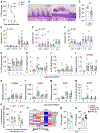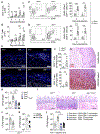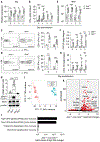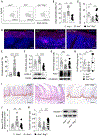Aberrant type 1 immunity drives susceptibility to mucosal fungal infections
- PMID: 33446526
- PMCID: PMC8326743
- DOI: 10.1126/science.aay5731
Aberrant type 1 immunity drives susceptibility to mucosal fungal infections
Abstract
Human monogenic disorders have revealed the critical contribution of type 17 responses in mucosal fungal surveillance. We unexpectedly found that in certain settings, enhanced type 1 immunity rather than defective type 17 responses can promote mucosal fungal infection susceptibility. Notably, in mice and humans with AIRE deficiency, an autoimmune disease characterized by selective susceptibility to mucosal but not systemic fungal infection, mucosal type 17 responses are intact while type 1 responses are exacerbated. These responses promote aberrant interferon-γ (IFN-γ)- and signal transducer and activator of transcription 1 (STAT1)-dependent epithelial barrier defects as well as mucosal fungal infection susceptibility. Concordantly, genetic and pharmacologic inhibition of IFN-γ or Janus kinase (JAK)-STAT signaling ameliorates mucosal fungal disease. Thus, we identify aberrant T cell-dependent, type 1 mucosal inflammation as a critical tissue-specific pathogenic mechanism that promotes mucosal fungal infection susceptibility in mice and humans.
Copyright © 2021 The Authors, some rights reserved; exclusive licensee American Association for the Advancement of Science. No claim to original U.S. Government Works.
Conflict of interest statement
Figures








Comment in
-
Comment on "Aberrant type 1 immunity drives susceptibility to mucosal fungal infections".Science. 2021 Sep 17;373(6561):eabi5459. doi: 10.1126/science.abi5459. Epub 2021 Sep 16. Science. 2021. PMID: 34529464 Free PMC article.
-
Comment on "Aberrant type 1 immunity drives susceptibility to mucosal fungal infections".Science. 2021 Sep 17;373(6561):eabi6235. doi: 10.1126/science.abi6235. Epub 2021 Sep 16. Science. 2021. PMID: 34529474
References
Publication types
MeSH terms
Substances
Grants and funding
LinkOut - more resources
Full Text Sources
Other Literature Sources
Molecular Biology Databases
Research Materials
Miscellaneous

